CSR Strategy and Implementation: Thrive Thirst's Business Report
VerifiedAdded on 2021/04/05
|11
|3182
|111
Report
AI Summary
This report provides a comprehensive analysis of Thrive Thirst's corporate social responsibility (CSR) initiatives. It begins with an introduction to Thrive Thirst, its global operations, and market share. The executive summary highlights the importance of CSR for the company's overall progress, focusing on its impact on market share, employee motivation, and brand recognition. The business rationale explains why Thrive Thirst should engage in CSR, emphasizing the benefits such as increased market share, enhanced brand identity, and employee retention. The report then delves into the strategic relevance of key issues, including working conditions, health issues (particularly in the context of COVID-19), environmental concerns, and gender equality. It provides recommendations for addressing these issues, suggesting a pathway based on ISO 26000 to embed CSR into the business strategy, including the preparation of a CSR mission statement and establishing an ethics code. The report emphasizes the need for Thrive Thirst to prioritize health and safety, working conditions, and environmental sustainability, and offers a phased approach to implementation.
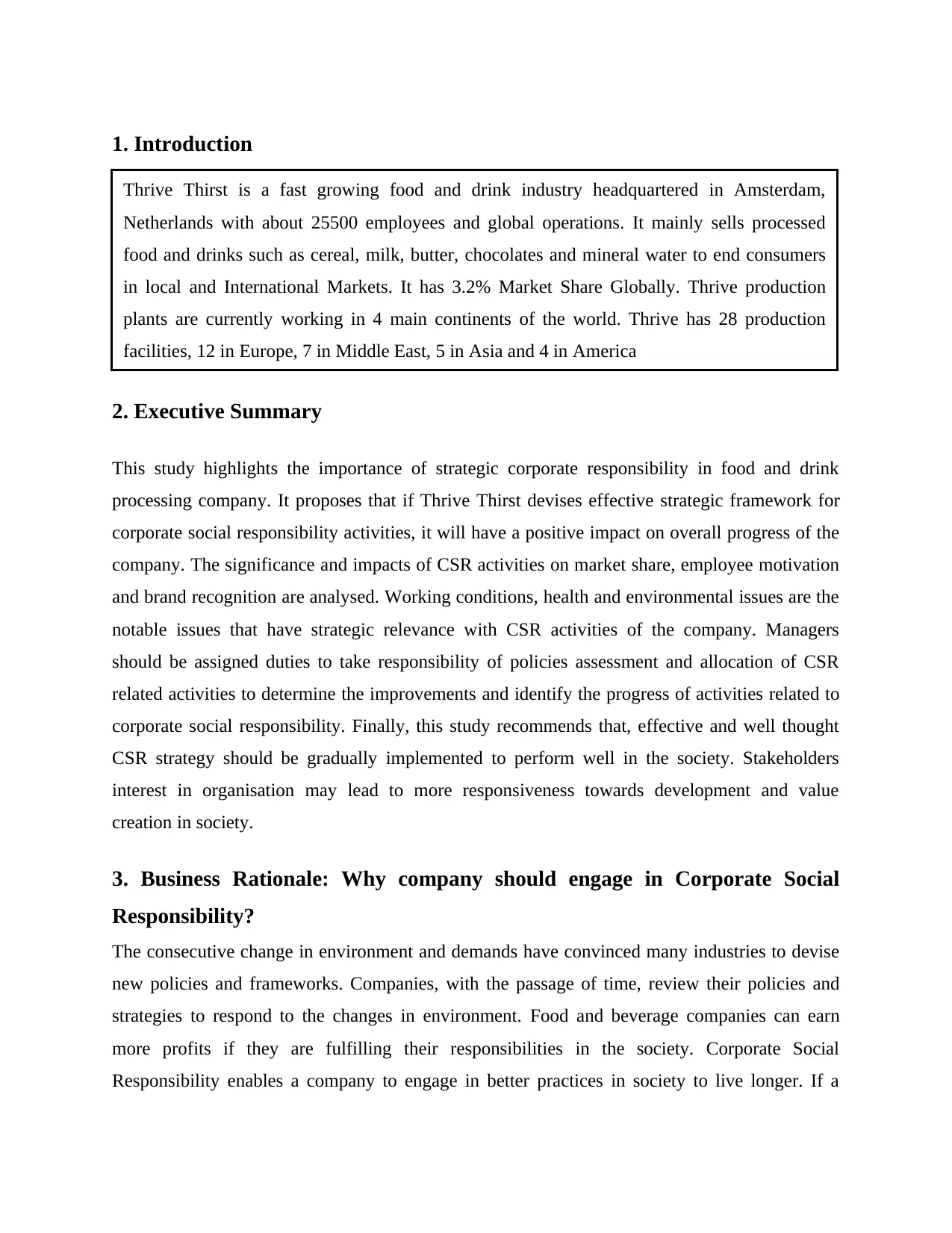
1. Introduction
2. Executive Summary
This study highlights the importance of strategic corporate responsibility in food and drink
processing company. It proposes that if Thrive Thirst devises effective strategic framework for
corporate social responsibility activities, it will have a positive impact on overall progress of the
company. The significance and impacts of CSR activities on market share, employee motivation
and brand recognition are analysed. Working conditions, health and environmental issues are the
notable issues that have strategic relevance with CSR activities of the company. Managers
should be assigned duties to take responsibility of policies assessment and allocation of CSR
related activities to determine the improvements and identify the progress of activities related to
corporate social responsibility. Finally, this study recommends that, effective and well thought
CSR strategy should be gradually implemented to perform well in the society. Stakeholders
interest in organisation may lead to more responsiveness towards development and value
creation in society.
3. Business Rationale: Why company should engage in Corporate Social
Responsibility?
The consecutive change in environment and demands have convinced many industries to devise
new policies and frameworks. Companies, with the passage of time, review their policies and
strategies to respond to the changes in environment. Food and beverage companies can earn
more profits if they are fulfilling their responsibilities in the society. Corporate Social
Responsibility enables a company to engage in better practices in society to live longer. If a
Thrive Thirst is a fast growing food and drink industry headquartered in Amsterdam,
Netherlands with about 25500 employees and global operations. It mainly sells processed
food and drinks such as cereal, milk, butter, chocolates and mineral water to end consumers
in local and International Markets. It has 3.2% Market Share Globally. Thrive production
plants are currently working in 4 main continents of the world. Thrive has 28 production
facilities, 12 in Europe, 7 in Middle East, 5 in Asia and 4 in America
2. Executive Summary
This study highlights the importance of strategic corporate responsibility in food and drink
processing company. It proposes that if Thrive Thirst devises effective strategic framework for
corporate social responsibility activities, it will have a positive impact on overall progress of the
company. The significance and impacts of CSR activities on market share, employee motivation
and brand recognition are analysed. Working conditions, health and environmental issues are the
notable issues that have strategic relevance with CSR activities of the company. Managers
should be assigned duties to take responsibility of policies assessment and allocation of CSR
related activities to determine the improvements and identify the progress of activities related to
corporate social responsibility. Finally, this study recommends that, effective and well thought
CSR strategy should be gradually implemented to perform well in the society. Stakeholders
interest in organisation may lead to more responsiveness towards development and value
creation in society.
3. Business Rationale: Why company should engage in Corporate Social
Responsibility?
The consecutive change in environment and demands have convinced many industries to devise
new policies and frameworks. Companies, with the passage of time, review their policies and
strategies to respond to the changes in environment. Food and beverage companies can earn
more profits if they are fulfilling their responsibilities in the society. Corporate Social
Responsibility enables a company to engage in better practices in society to live longer. If a
Thrive Thirst is a fast growing food and drink industry headquartered in Amsterdam,
Netherlands with about 25500 employees and global operations. It mainly sells processed
food and drinks such as cereal, milk, butter, chocolates and mineral water to end consumers
in local and International Markets. It has 3.2% Market Share Globally. Thrive production
plants are currently working in 4 main continents of the world. Thrive has 28 production
facilities, 12 in Europe, 7 in Middle East, 5 in Asia and 4 in America
Paraphrase This Document
Need a fresh take? Get an instant paraphrase of this document with our AI Paraphraser
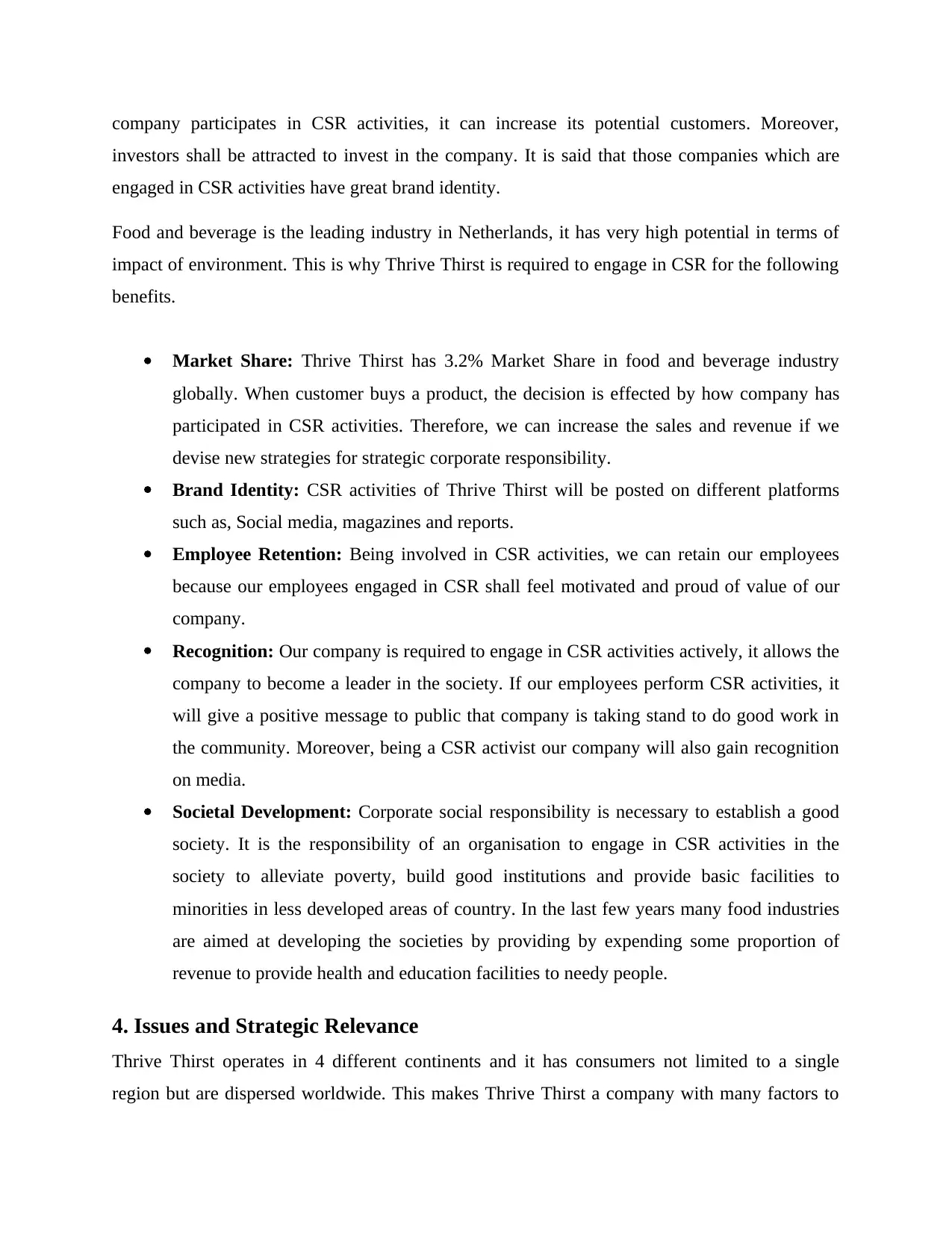
company participates in CSR activities, it can increase its potential customers. Moreover,
investors shall be attracted to invest in the company. It is said that those companies which are
engaged in CSR activities have great brand identity.
Food and beverage is the leading industry in Netherlands, it has very high potential in terms of
impact of environment. This is why Thrive Thirst is required to engage in CSR for the following
benefits.
Market Share: Thrive Thirst has 3.2% Market Share in food and beverage industry
globally. When customer buys a product, the decision is effected by how company has
participated in CSR activities. Therefore, we can increase the sales and revenue if we
devise new strategies for strategic corporate responsibility.
Brand Identity: CSR activities of Thrive Thirst will be posted on different platforms
such as, Social media, magazines and reports.
Employee Retention: Being involved in CSR activities, we can retain our employees
because our employees engaged in CSR shall feel motivated and proud of value of our
company.
Recognition: Our company is required to engage in CSR activities actively, it allows the
company to become a leader in the society. If our employees perform CSR activities, it
will give a positive message to public that company is taking stand to do good work in
the community. Moreover, being a CSR activist our company will also gain recognition
on media.
Societal Development: Corporate social responsibility is necessary to establish a good
society. It is the responsibility of an organisation to engage in CSR activities in the
society to alleviate poverty, build good institutions and provide basic facilities to
minorities in less developed areas of country. In the last few years many food industries
are aimed at developing the societies by providing by expending some proportion of
revenue to provide health and education facilities to needy people.
4. Issues and Strategic Relevance
Thrive Thirst operates in 4 different continents and it has consumers not limited to a single
region but are dispersed worldwide. This makes Thrive Thirst a company with many factors to
investors shall be attracted to invest in the company. It is said that those companies which are
engaged in CSR activities have great brand identity.
Food and beverage is the leading industry in Netherlands, it has very high potential in terms of
impact of environment. This is why Thrive Thirst is required to engage in CSR for the following
benefits.
Market Share: Thrive Thirst has 3.2% Market Share in food and beverage industry
globally. When customer buys a product, the decision is effected by how company has
participated in CSR activities. Therefore, we can increase the sales and revenue if we
devise new strategies for strategic corporate responsibility.
Brand Identity: CSR activities of Thrive Thirst will be posted on different platforms
such as, Social media, magazines and reports.
Employee Retention: Being involved in CSR activities, we can retain our employees
because our employees engaged in CSR shall feel motivated and proud of value of our
company.
Recognition: Our company is required to engage in CSR activities actively, it allows the
company to become a leader in the society. If our employees perform CSR activities, it
will give a positive message to public that company is taking stand to do good work in
the community. Moreover, being a CSR activist our company will also gain recognition
on media.
Societal Development: Corporate social responsibility is necessary to establish a good
society. It is the responsibility of an organisation to engage in CSR activities in the
society to alleviate poverty, build good institutions and provide basic facilities to
minorities in less developed areas of country. In the last few years many food industries
are aimed at developing the societies by providing by expending some proportion of
revenue to provide health and education facilities to needy people.
4. Issues and Strategic Relevance
Thrive Thirst operates in 4 different continents and it has consumers not limited to a single
region but are dispersed worldwide. This makes Thrive Thirst a company with many factors to
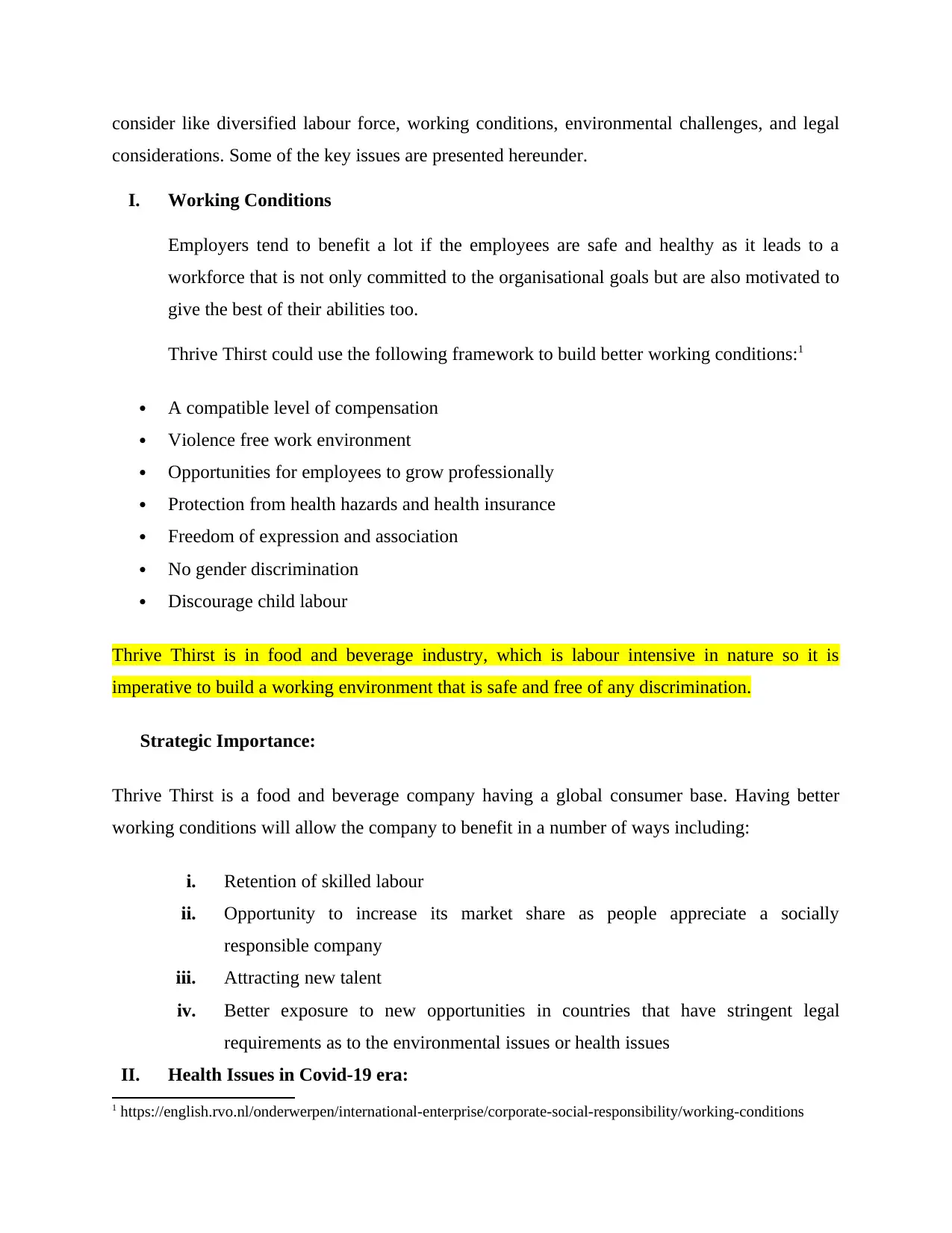
consider like diversified labour force, working conditions, environmental challenges, and legal
considerations. Some of the key issues are presented hereunder.
I. Working Conditions
Employers tend to benefit a lot if the employees are safe and healthy as it leads to a
workforce that is not only committed to the organisational goals but are also motivated to
give the best of their abilities too.
Thrive Thirst could use the following framework to build better working conditions:1
A compatible level of compensation
Violence free work environment
Opportunities for employees to grow professionally
Protection from health hazards and health insurance
Freedom of expression and association
No gender discrimination
Discourage child labour
Thrive Thirst is in food and beverage industry, which is labour intensive in nature so it is
imperative to build a working environment that is safe and free of any discrimination.
Strategic Importance:
Thrive Thirst is a food and beverage company having a global consumer base. Having better
working conditions will allow the company to benefit in a number of ways including:
i. Retention of skilled labour
ii. Opportunity to increase its market share as people appreciate a socially
responsible company
iii. Attracting new talent
iv. Better exposure to new opportunities in countries that have stringent legal
requirements as to the environmental issues or health issues
II. Health Issues in Covid-19 era:
1 https://english.rvo.nl/onderwerpen/international-enterprise/corporate-social-responsibility/working-conditions
considerations. Some of the key issues are presented hereunder.
I. Working Conditions
Employers tend to benefit a lot if the employees are safe and healthy as it leads to a
workforce that is not only committed to the organisational goals but are also motivated to
give the best of their abilities too.
Thrive Thirst could use the following framework to build better working conditions:1
A compatible level of compensation
Violence free work environment
Opportunities for employees to grow professionally
Protection from health hazards and health insurance
Freedom of expression and association
No gender discrimination
Discourage child labour
Thrive Thirst is in food and beverage industry, which is labour intensive in nature so it is
imperative to build a working environment that is safe and free of any discrimination.
Strategic Importance:
Thrive Thirst is a food and beverage company having a global consumer base. Having better
working conditions will allow the company to benefit in a number of ways including:
i. Retention of skilled labour
ii. Opportunity to increase its market share as people appreciate a socially
responsible company
iii. Attracting new talent
iv. Better exposure to new opportunities in countries that have stringent legal
requirements as to the environmental issues or health issues
II. Health Issues in Covid-19 era:
1 https://english.rvo.nl/onderwerpen/international-enterprise/corporate-social-responsibility/working-conditions
⊘ This is a preview!⊘
Do you want full access?
Subscribe today to unlock all pages.

Trusted by 1+ million students worldwide
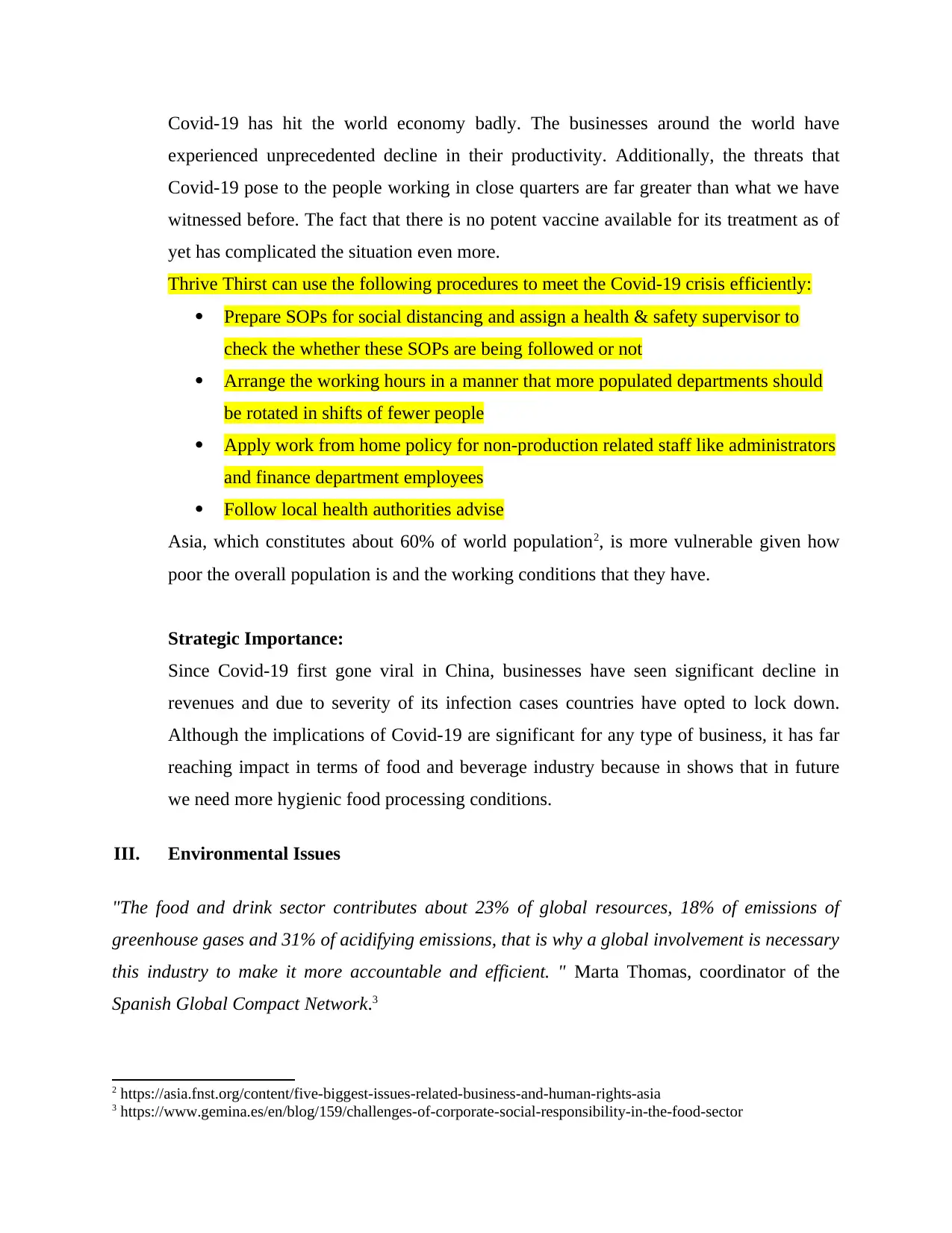
Covid-19 has hit the world economy badly. The businesses around the world have
experienced unprecedented decline in their productivity. Additionally, the threats that
Covid-19 pose to the people working in close quarters are far greater than what we have
witnessed before. The fact that there is no potent vaccine available for its treatment as of
yet has complicated the situation even more.
Thrive Thirst can use the following procedures to meet the Covid-19 crisis efficiently:
Prepare SOPs for social distancing and assign a health & safety supervisor to
check the whether these SOPs are being followed or not
Arrange the working hours in a manner that more populated departments should
be rotated in shifts of fewer people
Apply work from home policy for non-production related staff like administrators
and finance department employees
Follow local health authorities advise
Asia, which constitutes about 60% of world population2, is more vulnerable given how
poor the overall population is and the working conditions that they have.
Strategic Importance:
Since Covid-19 first gone viral in China, businesses have seen significant decline in
revenues and due to severity of its infection cases countries have opted to lock down.
Although the implications of Covid-19 are significant for any type of business, it has far
reaching impact in terms of food and beverage industry because in shows that in future
we need more hygienic food processing conditions.
III. Environmental Issues
"The food and drink sector contributes about 23% of global resources, 18% of emissions of
greenhouse gases and 31% of acidifying emissions, that is why a global involvement is necessary
this industry to make it more accountable and efficient. " Marta Thomas, coordinator of the
Spanish Global Compact Network.3
2 https://asia.fnst.org/content/five-biggest-issues-related-business-and-human-rights-asia
3 https://www.gemina.es/en/blog/159/challenges-of-corporate-social-responsibility-in-the-food-sector
experienced unprecedented decline in their productivity. Additionally, the threats that
Covid-19 pose to the people working in close quarters are far greater than what we have
witnessed before. The fact that there is no potent vaccine available for its treatment as of
yet has complicated the situation even more.
Thrive Thirst can use the following procedures to meet the Covid-19 crisis efficiently:
Prepare SOPs for social distancing and assign a health & safety supervisor to
check the whether these SOPs are being followed or not
Arrange the working hours in a manner that more populated departments should
be rotated in shifts of fewer people
Apply work from home policy for non-production related staff like administrators
and finance department employees
Follow local health authorities advise
Asia, which constitutes about 60% of world population2, is more vulnerable given how
poor the overall population is and the working conditions that they have.
Strategic Importance:
Since Covid-19 first gone viral in China, businesses have seen significant decline in
revenues and due to severity of its infection cases countries have opted to lock down.
Although the implications of Covid-19 are significant for any type of business, it has far
reaching impact in terms of food and beverage industry because in shows that in future
we need more hygienic food processing conditions.
III. Environmental Issues
"The food and drink sector contributes about 23% of global resources, 18% of emissions of
greenhouse gases and 31% of acidifying emissions, that is why a global involvement is necessary
this industry to make it more accountable and efficient. " Marta Thomas, coordinator of the
Spanish Global Compact Network.3
2 https://asia.fnst.org/content/five-biggest-issues-related-business-and-human-rights-asia
3 https://www.gemina.es/en/blog/159/challenges-of-corporate-social-responsibility-in-the-food-sector
Paraphrase This Document
Need a fresh take? Get an instant paraphrase of this document with our AI Paraphraser
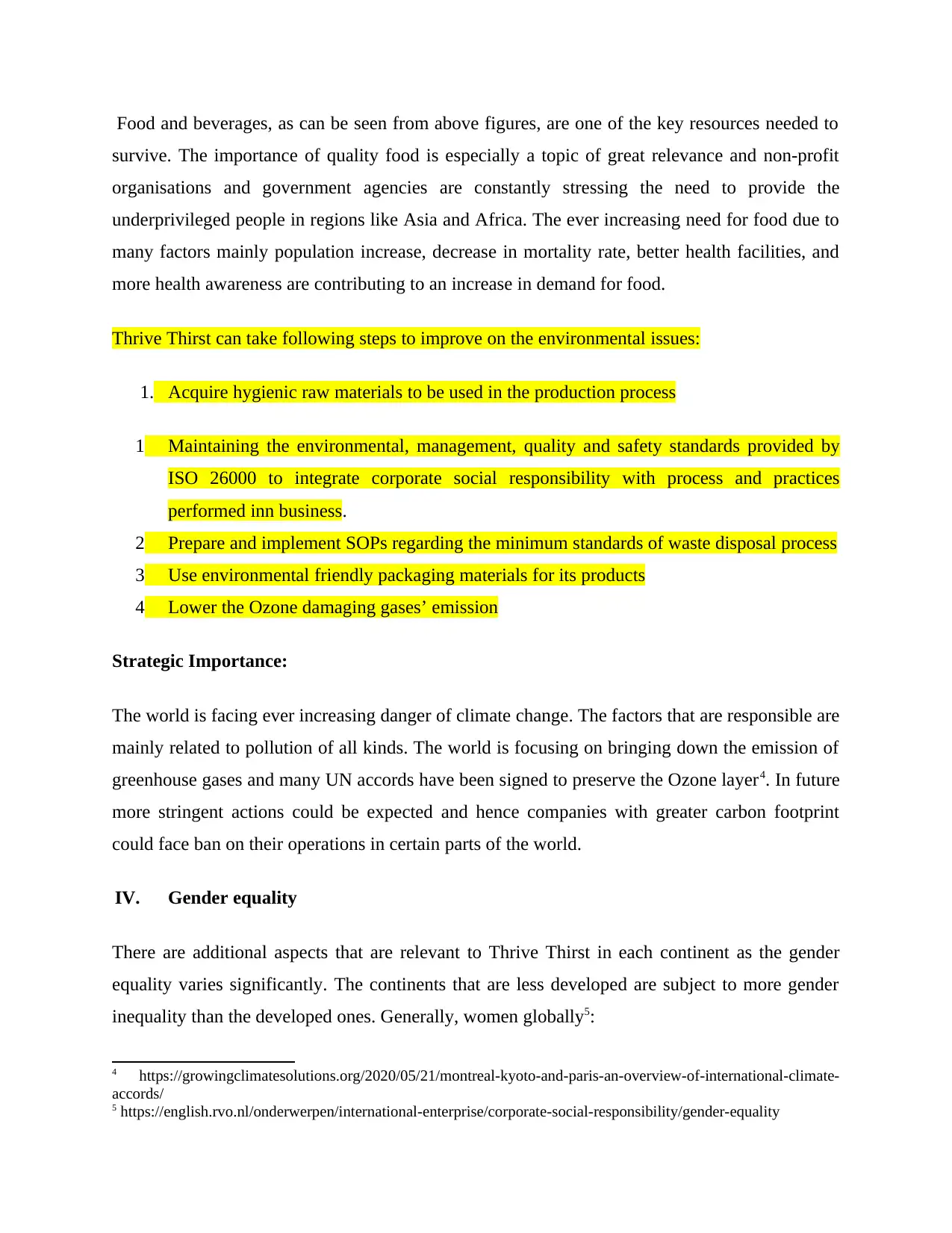
Food and beverages, as can be seen from above figures, are one of the key resources needed to
survive. The importance of quality food is especially a topic of great relevance and non-profit
organisations and government agencies are constantly stressing the need to provide the
underprivileged people in regions like Asia and Africa. The ever increasing need for food due to
many factors mainly population increase, decrease in mortality rate, better health facilities, and
more health awareness are contributing to an increase in demand for food.
Thrive Thirst can take following steps to improve on the environmental issues:
1. Acquire hygienic raw materials to be used in the production process
1 Maintaining the environmental, management, quality and safety standards provided by
ISO 26000 to integrate corporate social responsibility with process and practices
performed inn business.
2 Prepare and implement SOPs regarding the minimum standards of waste disposal process
3 Use environmental friendly packaging materials for its products
4 Lower the Ozone damaging gases’ emission
Strategic Importance:
The world is facing ever increasing danger of climate change. The factors that are responsible are
mainly related to pollution of all kinds. The world is focusing on bringing down the emission of
greenhouse gases and many UN accords have been signed to preserve the Ozone layer4. In future
more stringent actions could be expected and hence companies with greater carbon footprint
could face ban on their operations in certain parts of the world.
IV. Gender equality
There are additional aspects that are relevant to Thrive Thirst in each continent as the gender
equality varies significantly. The continents that are less developed are subject to more gender
inequality than the developed ones. Generally, women globally5:
4 https://growingclimatesolutions.org/2020/05/21/montreal-kyoto-and-paris-an-overview-of-international-climate-
accords/
5 https://english.rvo.nl/onderwerpen/international-enterprise/corporate-social-responsibility/gender-equality
survive. The importance of quality food is especially a topic of great relevance and non-profit
organisations and government agencies are constantly stressing the need to provide the
underprivileged people in regions like Asia and Africa. The ever increasing need for food due to
many factors mainly population increase, decrease in mortality rate, better health facilities, and
more health awareness are contributing to an increase in demand for food.
Thrive Thirst can take following steps to improve on the environmental issues:
1. Acquire hygienic raw materials to be used in the production process
1 Maintaining the environmental, management, quality and safety standards provided by
ISO 26000 to integrate corporate social responsibility with process and practices
performed inn business.
2 Prepare and implement SOPs regarding the minimum standards of waste disposal process
3 Use environmental friendly packaging materials for its products
4 Lower the Ozone damaging gases’ emission
Strategic Importance:
The world is facing ever increasing danger of climate change. The factors that are responsible are
mainly related to pollution of all kinds. The world is focusing on bringing down the emission of
greenhouse gases and many UN accords have been signed to preserve the Ozone layer4. In future
more stringent actions could be expected and hence companies with greater carbon footprint
could face ban on their operations in certain parts of the world.
IV. Gender equality
There are additional aspects that are relevant to Thrive Thirst in each continent as the gender
equality varies significantly. The continents that are less developed are subject to more gender
inequality than the developed ones. Generally, women globally5:
4 https://growingclimatesolutions.org/2020/05/21/montreal-kyoto-and-paris-an-overview-of-international-climate-
accords/
5 https://english.rvo.nl/onderwerpen/international-enterprise/corporate-social-responsibility/gender-equality
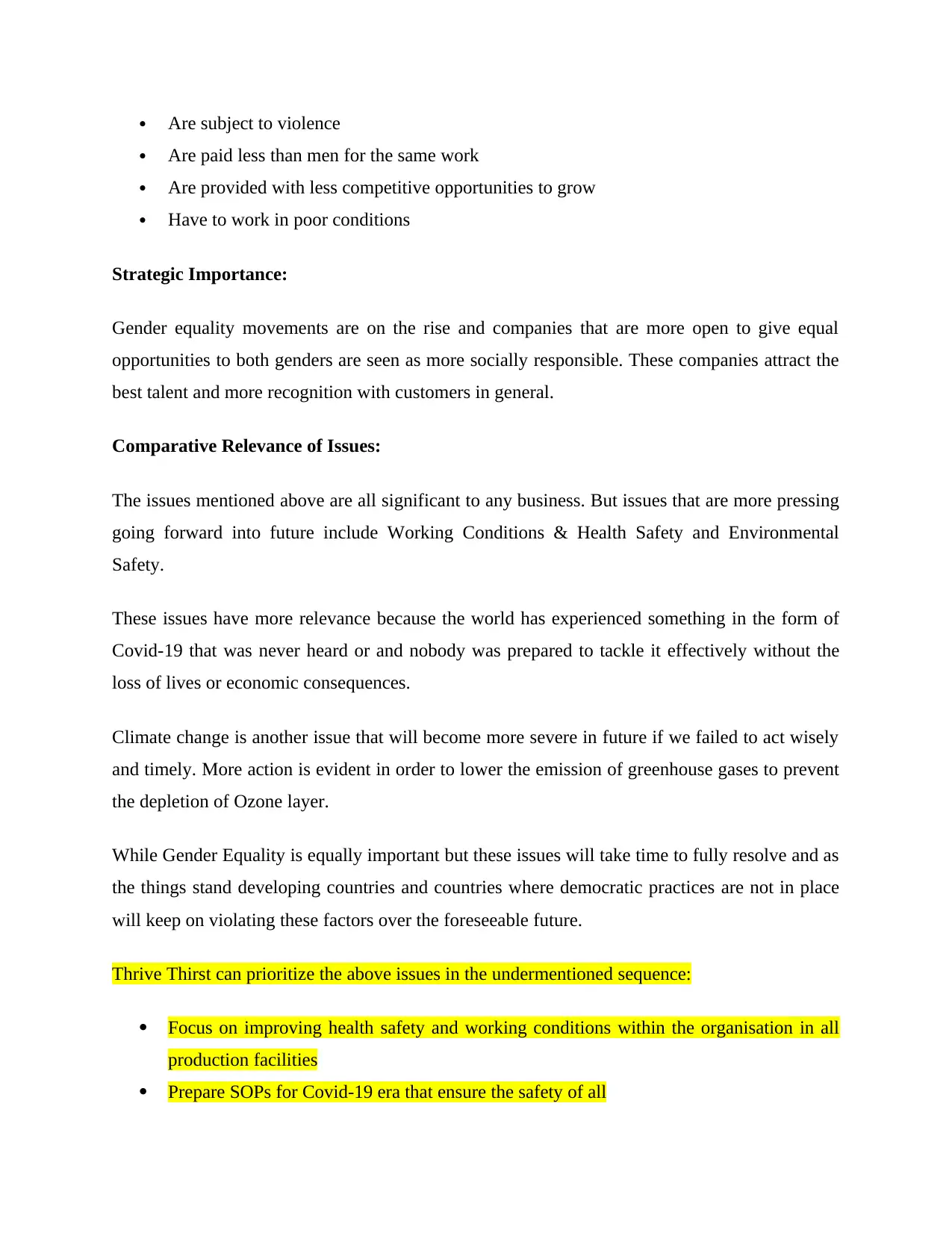
Are subject to violence
Are paid less than men for the same work
Are provided with less competitive opportunities to grow
Have to work in poor conditions
Strategic Importance:
Gender equality movements are on the rise and companies that are more open to give equal
opportunities to both genders are seen as more socially responsible. These companies attract the
best talent and more recognition with customers in general.
Comparative Relevance of Issues:
The issues mentioned above are all significant to any business. But issues that are more pressing
going forward into future include Working Conditions & Health Safety and Environmental
Safety.
These issues have more relevance because the world has experienced something in the form of
Covid-19 that was never heard or and nobody was prepared to tackle it effectively without the
loss of lives or economic consequences.
Climate change is another issue that will become more severe in future if we failed to act wisely
and timely. More action is evident in order to lower the emission of greenhouse gases to prevent
the depletion of Ozone layer.
While Gender Equality is equally important but these issues will take time to fully resolve and as
the things stand developing countries and countries where democratic practices are not in place
will keep on violating these factors over the foreseeable future.
Thrive Thirst can prioritize the above issues in the undermentioned sequence:
Focus on improving health safety and working conditions within the organisation in all
production facilities
Prepare SOPs for Covid-19 era that ensure the safety of all
Are paid less than men for the same work
Are provided with less competitive opportunities to grow
Have to work in poor conditions
Strategic Importance:
Gender equality movements are on the rise and companies that are more open to give equal
opportunities to both genders are seen as more socially responsible. These companies attract the
best talent and more recognition with customers in general.
Comparative Relevance of Issues:
The issues mentioned above are all significant to any business. But issues that are more pressing
going forward into future include Working Conditions & Health Safety and Environmental
Safety.
These issues have more relevance because the world has experienced something in the form of
Covid-19 that was never heard or and nobody was prepared to tackle it effectively without the
loss of lives or economic consequences.
Climate change is another issue that will become more severe in future if we failed to act wisely
and timely. More action is evident in order to lower the emission of greenhouse gases to prevent
the depletion of Ozone layer.
While Gender Equality is equally important but these issues will take time to fully resolve and as
the things stand developing countries and countries where democratic practices are not in place
will keep on violating these factors over the foreseeable future.
Thrive Thirst can prioritize the above issues in the undermentioned sequence:
Focus on improving health safety and working conditions within the organisation in all
production facilities
Prepare SOPs for Covid-19 era that ensure the safety of all
⊘ This is a preview!⊘
Do you want full access?
Subscribe today to unlock all pages.

Trusted by 1+ million students worldwide
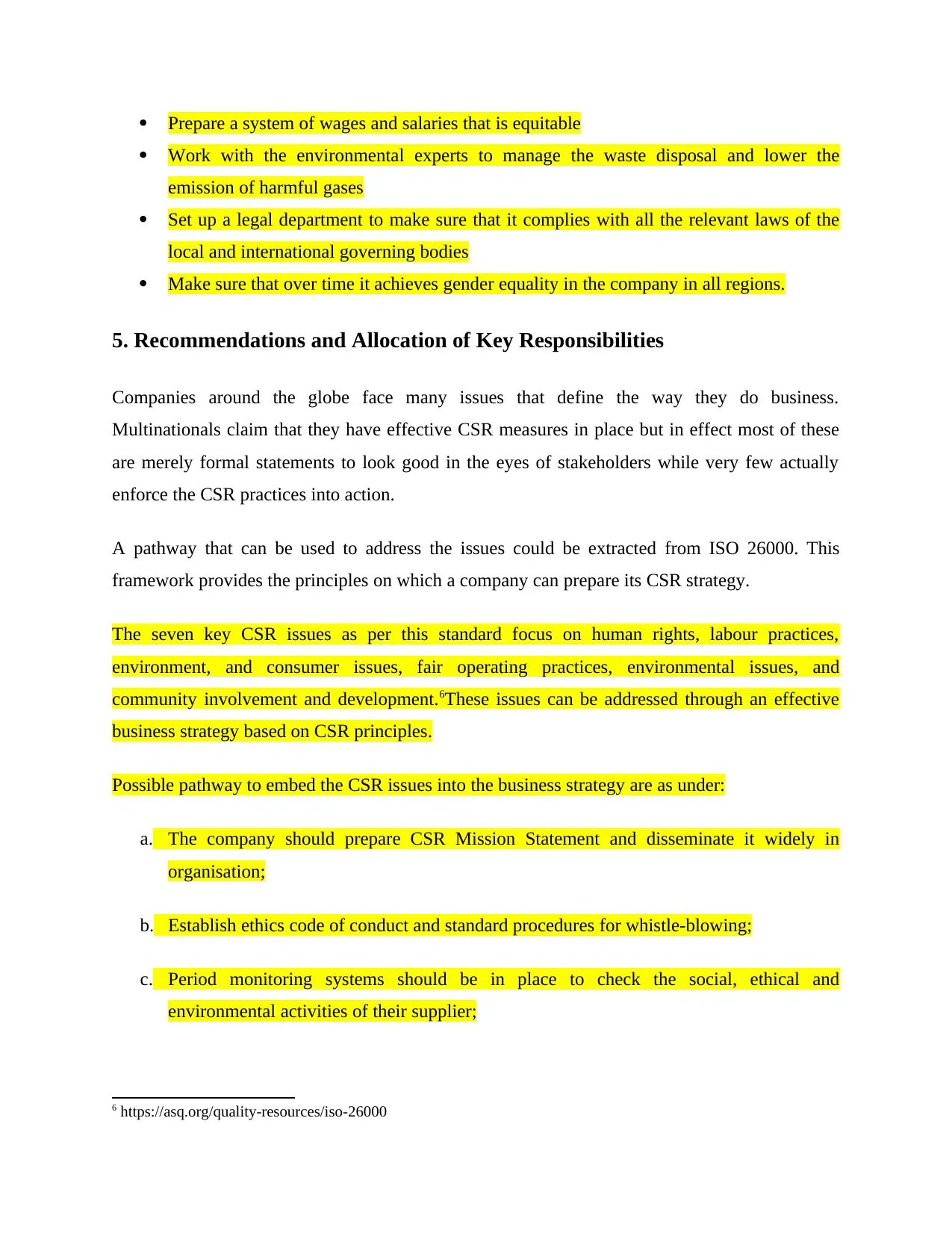
Prepare a system of wages and salaries that is equitable
Work with the environmental experts to manage the waste disposal and lower the
emission of harmful gases
Set up a legal department to make sure that it complies with all the relevant laws of the
local and international governing bodies
Make sure that over time it achieves gender equality in the company in all regions.
5. Recommendations and Allocation of Key Responsibilities
Companies around the globe face many issues that define the way they do business.
Multinationals claim that they have effective CSR measures in place but in effect most of these
are merely formal statements to look good in the eyes of stakeholders while very few actually
enforce the CSR practices into action.
A pathway that can be used to address the issues could be extracted from ISO 26000. This
framework provides the principles on which a company can prepare its CSR strategy.
The seven key CSR issues as per this standard focus on human rights, labour practices,
environment, and consumer issues, fair operating practices, environmental issues, and
community involvement and development.6These issues can be addressed through an effective
business strategy based on CSR principles.
Possible pathway to embed the CSR issues into the business strategy are as under:
a. The company should prepare CSR Mission Statement and disseminate it widely in
organisation;
b. Establish ethics code of conduct and standard procedures for whistle-blowing;
c. Period monitoring systems should be in place to check the social, ethical and
environmental activities of their supplier;
6 https://asq.org/quality-resources/iso-26000
Work with the environmental experts to manage the waste disposal and lower the
emission of harmful gases
Set up a legal department to make sure that it complies with all the relevant laws of the
local and international governing bodies
Make sure that over time it achieves gender equality in the company in all regions.
5. Recommendations and Allocation of Key Responsibilities
Companies around the globe face many issues that define the way they do business.
Multinationals claim that they have effective CSR measures in place but in effect most of these
are merely formal statements to look good in the eyes of stakeholders while very few actually
enforce the CSR practices into action.
A pathway that can be used to address the issues could be extracted from ISO 26000. This
framework provides the principles on which a company can prepare its CSR strategy.
The seven key CSR issues as per this standard focus on human rights, labour practices,
environment, and consumer issues, fair operating practices, environmental issues, and
community involvement and development.6These issues can be addressed through an effective
business strategy based on CSR principles.
Possible pathway to embed the CSR issues into the business strategy are as under:
a. The company should prepare CSR Mission Statement and disseminate it widely in
organisation;
b. Establish ethics code of conduct and standard procedures for whistle-blowing;
c. Period monitoring systems should be in place to check the social, ethical and
environmental activities of their supplier;
6 https://asq.org/quality-resources/iso-26000
Paraphrase This Document
Need a fresh take? Get an instant paraphrase of this document with our AI Paraphraser
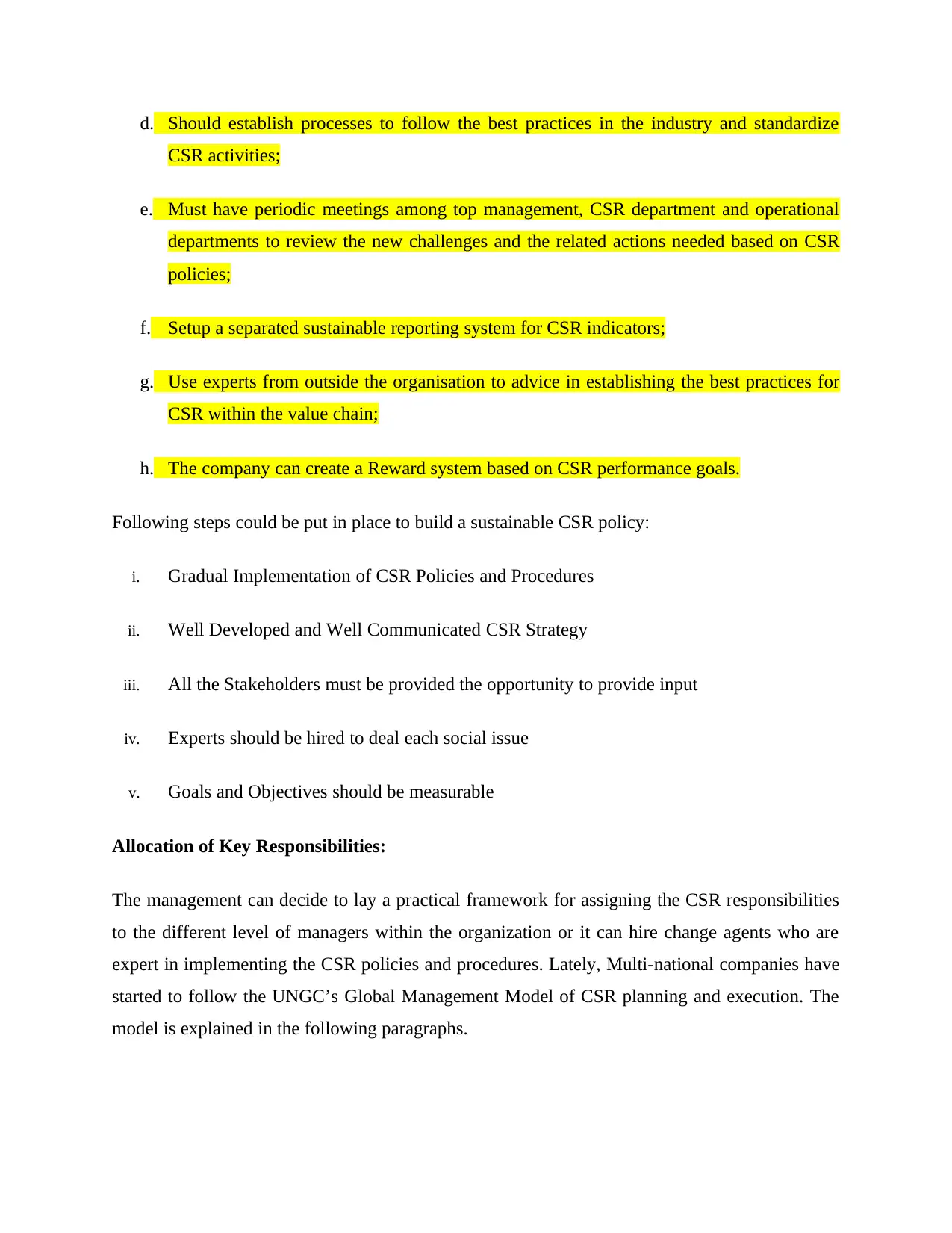
d. Should establish processes to follow the best practices in the industry and standardize
CSR activities;
e. Must have periodic meetings among top management, CSR department and operational
departments to review the new challenges and the related actions needed based on CSR
policies;
f. Setup a separated sustainable reporting system for CSR indicators;
g. Use experts from outside the organisation to advice in establishing the best practices for
CSR within the value chain;
h. The company can create a Reward system based on CSR performance goals.
Following steps could be put in place to build a sustainable CSR policy:
i. Gradual Implementation of CSR Policies and Procedures
ii. Well Developed and Well Communicated CSR Strategy
iii. All the Stakeholders must be provided the opportunity to provide input
iv. Experts should be hired to deal each social issue
v. Goals and Objectives should be measurable
Allocation of Key Responsibilities:
The management can decide to lay a practical framework for assigning the CSR responsibilities
to the different level of managers within the organization or it can hire change agents who are
expert in implementing the CSR policies and procedures. Lately, Multi-national companies have
started to follow the UNGC’s Global Management Model of CSR planning and execution. The
model is explained in the following paragraphs.
CSR activities;
e. Must have periodic meetings among top management, CSR department and operational
departments to review the new challenges and the related actions needed based on CSR
policies;
f. Setup a separated sustainable reporting system for CSR indicators;
g. Use experts from outside the organisation to advice in establishing the best practices for
CSR within the value chain;
h. The company can create a Reward system based on CSR performance goals.
Following steps could be put in place to build a sustainable CSR policy:
i. Gradual Implementation of CSR Policies and Procedures
ii. Well Developed and Well Communicated CSR Strategy
iii. All the Stakeholders must be provided the opportunity to provide input
iv. Experts should be hired to deal each social issue
v. Goals and Objectives should be measurable
Allocation of Key Responsibilities:
The management can decide to lay a practical framework for assigning the CSR responsibilities
to the different level of managers within the organization or it can hire change agents who are
expert in implementing the CSR policies and procedures. Lately, Multi-national companies have
started to follow the UNGC’s Global Management Model of CSR planning and execution. The
model is explained in the following paragraphs.
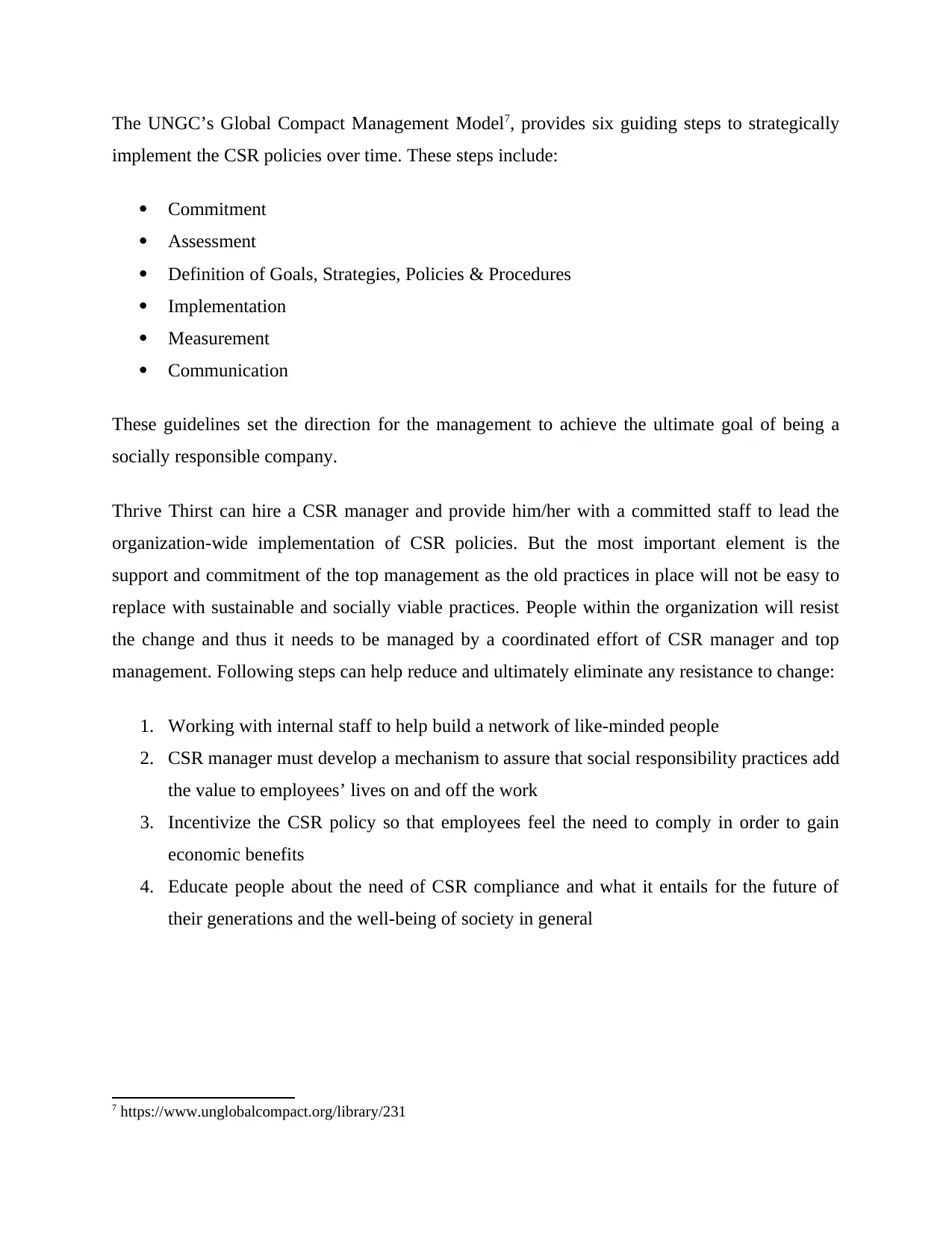
The UNGC’s Global Compact Management Model7, provides six guiding steps to strategically
implement the CSR policies over time. These steps include:
Commitment
Assessment
Definition of Goals, Strategies, Policies & Procedures
Implementation
Measurement
Communication
These guidelines set the direction for the management to achieve the ultimate goal of being a
socially responsible company.
Thrive Thirst can hire a CSR manager and provide him/her with a committed staff to lead the
organization-wide implementation of CSR policies. But the most important element is the
support and commitment of the top management as the old practices in place will not be easy to
replace with sustainable and socially viable practices. People within the organization will resist
the change and thus it needs to be managed by a coordinated effort of CSR manager and top
management. Following steps can help reduce and ultimately eliminate any resistance to change:
1. Working with internal staff to help build a network of like-minded people
2. CSR manager must develop a mechanism to assure that social responsibility practices add
the value to employees’ lives on and off the work
3. Incentivize the CSR policy so that employees feel the need to comply in order to gain
economic benefits
4. Educate people about the need of CSR compliance and what it entails for the future of
their generations and the well-being of society in general
7 https://www.unglobalcompact.org/library/231
implement the CSR policies over time. These steps include:
Commitment
Assessment
Definition of Goals, Strategies, Policies & Procedures
Implementation
Measurement
Communication
These guidelines set the direction for the management to achieve the ultimate goal of being a
socially responsible company.
Thrive Thirst can hire a CSR manager and provide him/her with a committed staff to lead the
organization-wide implementation of CSR policies. But the most important element is the
support and commitment of the top management as the old practices in place will not be easy to
replace with sustainable and socially viable practices. People within the organization will resist
the change and thus it needs to be managed by a coordinated effort of CSR manager and top
management. Following steps can help reduce and ultimately eliminate any resistance to change:
1. Working with internal staff to help build a network of like-minded people
2. CSR manager must develop a mechanism to assure that social responsibility practices add
the value to employees’ lives on and off the work
3. Incentivize the CSR policy so that employees feel the need to comply in order to gain
economic benefits
4. Educate people about the need of CSR compliance and what it entails for the future of
their generations and the well-being of society in general
7 https://www.unglobalcompact.org/library/231
⊘ This is a preview!⊘
Do you want full access?
Subscribe today to unlock all pages.

Trusted by 1+ million students worldwide
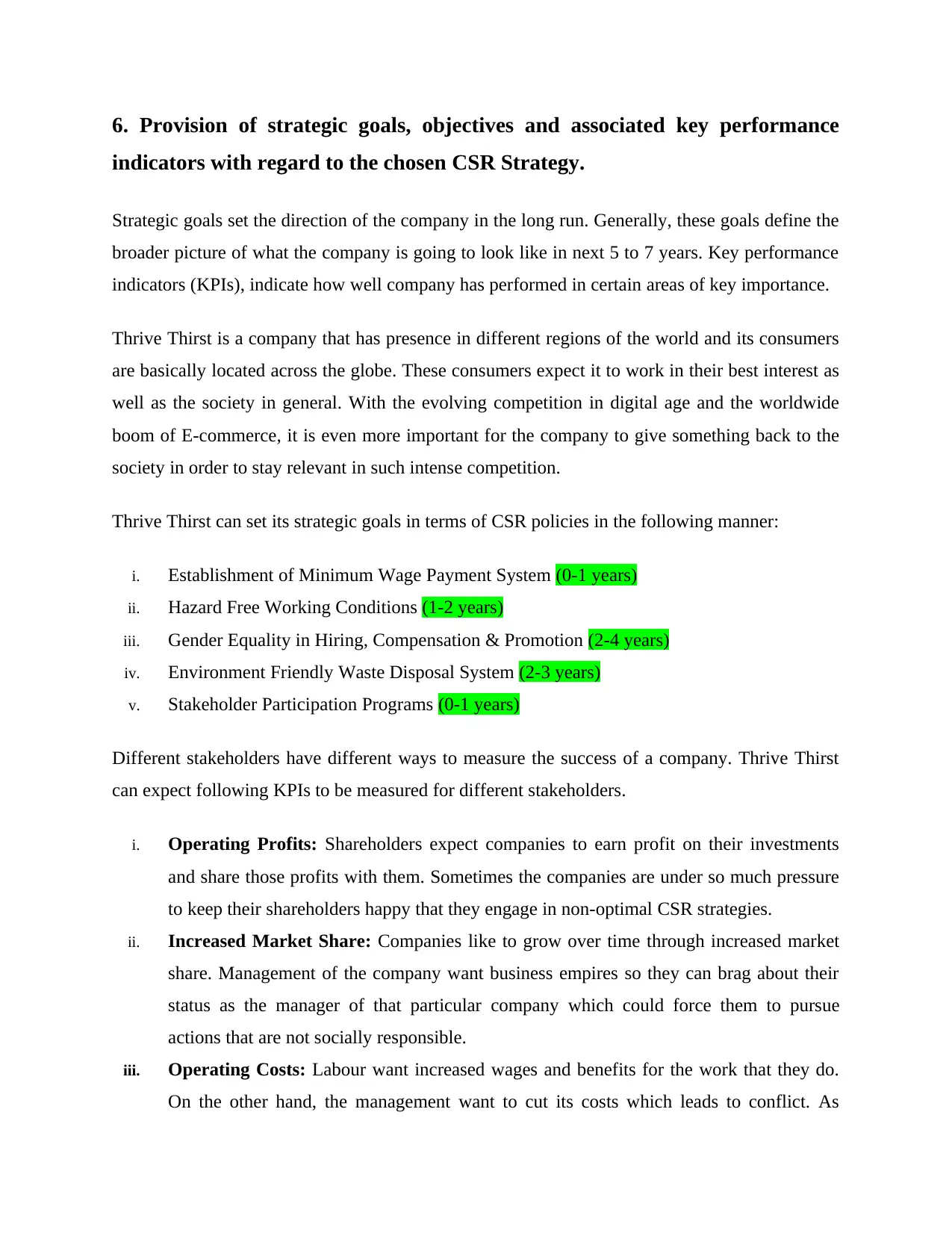
6. Provision of strategic goals, objectives and associated key performance
indicators with regard to the chosen CSR Strategy.
Strategic goals set the direction of the company in the long run. Generally, these goals define the
broader picture of what the company is going to look like in next 5 to 7 years. Key performance
indicators (KPIs), indicate how well company has performed in certain areas of key importance.
Thrive Thirst is a company that has presence in different regions of the world and its consumers
are basically located across the globe. These consumers expect it to work in their best interest as
well as the society in general. With the evolving competition in digital age and the worldwide
boom of E-commerce, it is even more important for the company to give something back to the
society in order to stay relevant in such intense competition.
Thrive Thirst can set its strategic goals in terms of CSR policies in the following manner:
i. Establishment of Minimum Wage Payment System (0-1 years)
ii. Hazard Free Working Conditions (1-2 years)
iii. Gender Equality in Hiring, Compensation & Promotion (2-4 years)
iv. Environment Friendly Waste Disposal System (2-3 years)
v. Stakeholder Participation Programs (0-1 years)
Different stakeholders have different ways to measure the success of a company. Thrive Thirst
can expect following KPIs to be measured for different stakeholders.
i. Operating Profits: Shareholders expect companies to earn profit on their investments
and share those profits with them. Sometimes the companies are under so much pressure
to keep their shareholders happy that they engage in non-optimal CSR strategies.
ii. Increased Market Share: Companies like to grow over time through increased market
share. Management of the company want business empires so they can brag about their
status as the manager of that particular company which could force them to pursue
actions that are not socially responsible.
iii. Operating Costs: Labour want increased wages and benefits for the work that they do.
On the other hand, the management want to cut its costs which leads to conflict. As
indicators with regard to the chosen CSR Strategy.
Strategic goals set the direction of the company in the long run. Generally, these goals define the
broader picture of what the company is going to look like in next 5 to 7 years. Key performance
indicators (KPIs), indicate how well company has performed in certain areas of key importance.
Thrive Thirst is a company that has presence in different regions of the world and its consumers
are basically located across the globe. These consumers expect it to work in their best interest as
well as the society in general. With the evolving competition in digital age and the worldwide
boom of E-commerce, it is even more important for the company to give something back to the
society in order to stay relevant in such intense competition.
Thrive Thirst can set its strategic goals in terms of CSR policies in the following manner:
i. Establishment of Minimum Wage Payment System (0-1 years)
ii. Hazard Free Working Conditions (1-2 years)
iii. Gender Equality in Hiring, Compensation & Promotion (2-4 years)
iv. Environment Friendly Waste Disposal System (2-3 years)
v. Stakeholder Participation Programs (0-1 years)
Different stakeholders have different ways to measure the success of a company. Thrive Thirst
can expect following KPIs to be measured for different stakeholders.
i. Operating Profits: Shareholders expect companies to earn profit on their investments
and share those profits with them. Sometimes the companies are under so much pressure
to keep their shareholders happy that they engage in non-optimal CSR strategies.
ii. Increased Market Share: Companies like to grow over time through increased market
share. Management of the company want business empires so they can brag about their
status as the manager of that particular company which could force them to pursue
actions that are not socially responsible.
iii. Operating Costs: Labour want increased wages and benefits for the work that they do.
On the other hand, the management want to cut its costs which leads to conflict. As
Paraphrase This Document
Need a fresh take? Get an instant paraphrase of this document with our AI Paraphraser
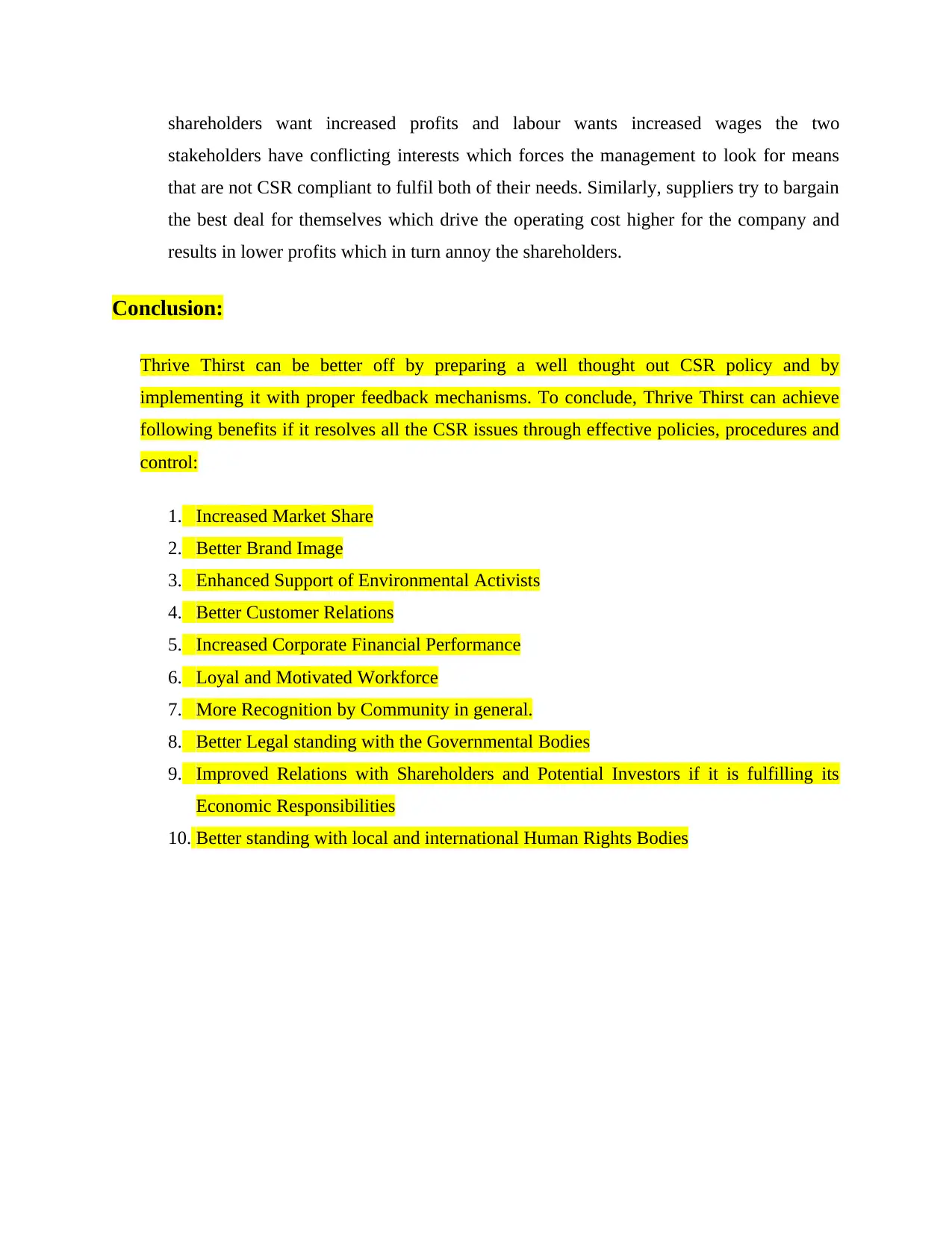
shareholders want increased profits and labour wants increased wages the two
stakeholders have conflicting interests which forces the management to look for means
that are not CSR compliant to fulfil both of their needs. Similarly, suppliers try to bargain
the best deal for themselves which drive the operating cost higher for the company and
results in lower profits which in turn annoy the shareholders.
Conclusion:
Thrive Thirst can be better off by preparing a well thought out CSR policy and by
implementing it with proper feedback mechanisms. To conclude, Thrive Thirst can achieve
following benefits if it resolves all the CSR issues through effective policies, procedures and
control:
1. Increased Market Share
2. Better Brand Image
3. Enhanced Support of Environmental Activists
4. Better Customer Relations
5. Increased Corporate Financial Performance
6. Loyal and Motivated Workforce
7. More Recognition by Community in general.
8. Better Legal standing with the Governmental Bodies
9. Improved Relations with Shareholders and Potential Investors if it is fulfilling its
Economic Responsibilities
10. Better standing with local and international Human Rights Bodies
stakeholders have conflicting interests which forces the management to look for means
that are not CSR compliant to fulfil both of their needs. Similarly, suppliers try to bargain
the best deal for themselves which drive the operating cost higher for the company and
results in lower profits which in turn annoy the shareholders.
Conclusion:
Thrive Thirst can be better off by preparing a well thought out CSR policy and by
implementing it with proper feedback mechanisms. To conclude, Thrive Thirst can achieve
following benefits if it resolves all the CSR issues through effective policies, procedures and
control:
1. Increased Market Share
2. Better Brand Image
3. Enhanced Support of Environmental Activists
4. Better Customer Relations
5. Increased Corporate Financial Performance
6. Loyal and Motivated Workforce
7. More Recognition by Community in general.
8. Better Legal standing with the Governmental Bodies
9. Improved Relations with Shareholders and Potential Investors if it is fulfilling its
Economic Responsibilities
10. Better standing with local and international Human Rights Bodies
1 out of 11
Related Documents
Your All-in-One AI-Powered Toolkit for Academic Success.
+13062052269
info@desklib.com
Available 24*7 on WhatsApp / Email
![[object Object]](/_next/static/media/star-bottom.7253800d.svg)
Unlock your academic potential
Copyright © 2020–2026 A2Z Services. All Rights Reserved. Developed and managed by ZUCOL.





